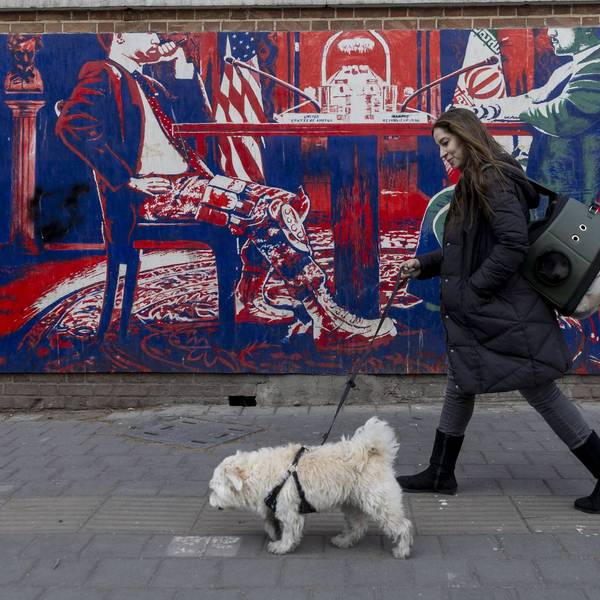SECRETARY OF STATE Colin Powell has given three reasons for a US-led war in Iraq:
- Iraq has retained chemical and biological agents (or refused to provide convincing evidence of their destruction) in defiance of repeated UN resolutions.
- Because Iraq's chemical or biological weapons (and perhaps in the future, nuclear weapons) could be given to terrorists, they pose a potential threat to the United States.
- Saddam Hussein's use of chemical agents against Iraqi Kurds and Iranian soldiers shows that he is capable of facilitating the use of weapons of mass destruction.
Even if these points are true, a US-launched ground war aimed at overthrowing Hussein would be a dangerous over-reaction.
While Iraq may have some chemical or biological weapons, it is far from alone in this respect. Of 193 nations, only 115 have signed both the treaty that bans chemical weapons and the treaty that bans biological weapons. Twenty-five countries, including Israel, Egypt, and Syria, have not signed either ban and 53 others have signed just one of the two treaties. Like Iraq, some of these 78 countries have repressive authoritarian regimes. Yet obviously the United States cannot forcibly change all repressive governments in countries that may have chemical or biological weapons and channels by which terrorists might obtain those weapons.
In fact, a major war to overthrow Saddam could actually increase the risk of terrorist attacks with weapons of mass destruction because it could fuel the fury of Islamic fundamentalists, sealing their determination to obtain chemical, biological, or radiological weapons to use in acts of revenge on behalf of the Islamic world.
A better way to respond to Iraq's noncompliance with UN resolutions -- a way that is morally justified, legal under international law, commensurate with the problem and likely to reduce the risks of terrorist attack -- is a process of ''disarming'' inspections, aimed at bringing about weapons of mass destruction disarmament in Iraq. The reinforced inspection process should start with a new UN resolution that lists specific requirements and specific consequences if the requirements are not met, along the following lines:
To insure that Iraq does not try to move or hide possible chemical or biological weapon stocks or facilities identified by US and other intelligence agencies, there should be continuous surveillance flights throughout Iraq. U-2 and other surveillance aircraft, drones, and satellites can provide detailed digital imagery of the entire area of Iraq, which can be rapidly analyzed by computer programs focusing on suspect locations, structures, and movements.
- The UN Security Council should inform Iraq that if it interferes with or threatens the surveillance, its air defense system and air force will be destroyed by aircraft or missile attack.
- Iraq should be informed that any suspect sites not opened to inspectors without delay will be subject to being destroyed by missile or aircraft attack, after a brief warning period in which people can be evacuated. The United States should supply a list of suspect sites, to remain untouched by Iraq and under continuous surveillance until they can be inspected, and, if found to contain banned material, dismantled. At the first sign of Iraqi interference, the suspect sites should be bombed.
- The number of inspectors should be increased several fold and scores of translators should be provided. In addition to making announced visits, inspectors accompanied by translators should circulate routinely throughout the country in factories, in military units, and in academic, research, and government laboratories. In addition, the United States and other countries should continue to solicit information about banned programs secretly from unidentified Iraqis; and they should make their findings available to UN inspectors in a manner that protects the sources.
- There should be an on-going, narrowly focused arms embargo, such as that proposed by Win without War. Stringent enforcement of this embargo by UN inspectors at aircraft, ship, and ground points of entry would permit the UN to lift the broad economic sanctions that have caused widespread malnutrition and death from preventable disease among Iraqi civilians. This would help end the terrible suffering of the Iraqi people.
To support the disarming inspections, the UN would keep sizable forces in the region, perhaps 50,000 ground and air combat and support troops, drawn from many countries, with contingents deployed on a rotating basis.
This beefed-up inspection regime would raise the barrier to a unilateral US war in Iraq by explicitly addressing the dangers the United States is citing as a casus belli: the possibility that Iraq either now has hidden chemical or biological weapon stocks or facilities, or will in future obtain chemical, biological, or nuclear weapons. On-going, reinforced inspections will assure that all suspect sites can be searched without being sanitized, and they will assure that Iraq cannot start any new production program.



